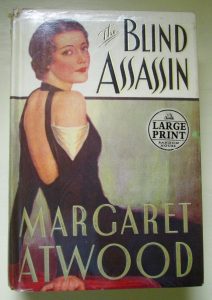In her dazzlingly brilliant novel, The Blind Assassin, published in 2000, Margaret Atwood tells the story of an eighty-two-year-old Canadian woman, Iris Chase Griffen, who is writing her memoirs as a legacy for her estranged grown granddaughter, Sabrina.
Within that story is another story – a steamy novel purportedly written by Iris’s sister Laura before she drove her car off a bridge to her death at the age of twenty-five in 1945. And within that steamy novel are chapters of the book her lover is writing — far-out, outer-spacey, pulp fiction he’s concocting to support his dicey life on the run.
Like those Russian dolls that fit one inside the other, this book’s stories-within-stories bedazzle. I stayed up late last night to finish reading The Blind Assassin, and I’m still bedazzled by it this morning.

Early in this hefty novel Iris the protagonist writes: “I’ve written nothing for the past week. I lost the heart for it. … But I’ve begun again, I notice. I’ve taken up my black scrawl; it unwinds in a long dark thread of ink across the page, tangled but legible. …
“Why is it we want so badly to memorialize ourselves? Even while we’re still alive,” she writes. “We wish to assert our existence… We monogram our linen, we carve our names on trees, we scrawl them on washroom walls. It’s all the same impulse. What do we hope from it? … At the very least we want a witness. We can’t stand the idea of our own voices falling silent finally, like a radio running down.”
Iris’s acerbic, questioning voice has made me think (again) of memoir writing. Why do we do it? Why do we bother? As I write in my steadfast, longsuffering journal almost every morning, unwinding my own black scrawl “in a long dark thread of ink across the page”: “Who reads books anymore anyway?” and “Who cares???” Over the past thirty years I’ve written three memoirs, and as far as I know those for whom I specifically wrote them have not yet read them. Discouraging.
As a reader, though, and as a former teacher of creative nonfiction writing, I’ve always considered memoirs, as well as autobiographies by and biographies of famous people, my favorite genres. How better to learn about another person’s life on a deeper than social-superficial level — where they’ve been, what has made them who they are, what goes on in their hearts and minds?
As a child in the ‘50s I marched off to our local library to check out biographies of famous women – Dolly Madison and Marie Curie now come to mind – who taught me that women could, in fact, make a difference in what appeared to me even then to be a man’s world. Ever since, I’ve especially savored the heart-to-heartness of memoirs by ordinary (that is to say, not famous) people – even fictional ones, like Iris Griffen’s.
Throughout The Blind Assassin I found myself nodding – Yes, I’ve been there and felt that way too! Memoirs make us feel more connected, less alone in the world. They also stretch our hearts and take us to places we’ve never been and will likely never see otherwise. And, too, I feel that well crafted memoirs prove that we are all stories-within-stories; we are all, in that sense, Russian dolls.
In the ten years I taught creative nonfiction writing in Taos, New Mexico, I had a number of older students who had a dream of writing their memoirs – not for fame or fortune, of course, but for friends and family.
One of those students, retired psychology professor Margery Reading, now in her early eighties, has just published that long-dreamed-of book, dedicated, she writes, “to my teachers and students, colleagues and classmates, family and friends,” titled Stories, Sketches & Snapshots. At the beginning of one chapter, Marge offers this quote: “If we don’t write, it’s imprisoned in our bodies. When we die, it dies.” (Author unknown.) Her poignant book is a tribute to beautiful memories set free.
Another of my former students, Lorraine Ciancio, has recently completed her long-awaited memoir, titled From Salt to Sage, which will soon be published. In this collection of vivid personal essays, enriched by her poetry and photography, Lorraine shares with her readers what it was like to grow up in an Italian family in the Bronx in the 1950s and where life has taken her since then.
Grace Fichtelberg, now ninety-three (please see my WOW post, “Amazing Grace,” of May 6, 2014), also a former student of mine, continues to work on her memoirs. I think if I were to press her, she’d tell me she still needs more time. (Her dry, New York sense of humor is one of the qualities that keeps her going.)
If anyone were to ask me now whether I thought she (or he) should follow her (or his) dream of writing a memoir, I’d give my wholehearted two-word advice: Do it! Not for fame or fortune, to be sure, and maybe not even for friends or family (who may or may not take the time to read what you’ve written), but at least for yourself. Set those Russian dolls free and let them dance. Who knows? Perhaps someone else at some point will be grateful that you did.
~ ~ ~
[Note: Please share the titles and authors of your favorite memoirs with other WOW readers in the Comments section below. Thank you!]
